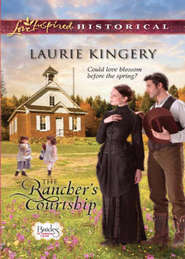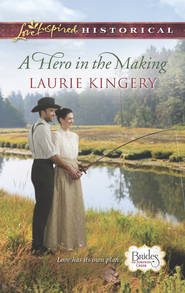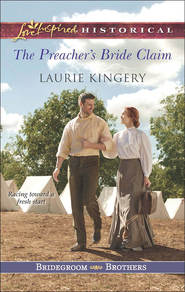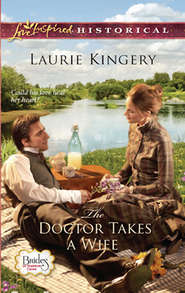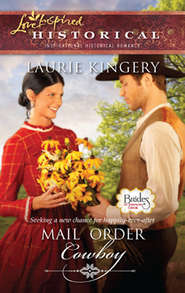По всем вопросам обращайтесь на: info@litportal.ru
(©) 2003-2024.
✖
Hill Country Cattleman
Настройки чтения
Размер шрифта
Высота строк
Поля
Questions for Discussion (#litres_trial_promo)
Chapter One
Simpson Creek, Texas—July 7, 1868
“Simpson Creek!” the driver called out as the coach rolled onto the bridge over the creek that had given the town its name.
“Thank goodness,” grumbled Violet’s brother Edward, Viscount Greyshaw, rubbing his back and glancing resentfully at the top of the coach after the driver hit yet another rut. He grabbed for the overhead strap to steady himself. “He does that on purpose,” he muttered, then added, for the hundredth time, “I don’t know why Nick chose to live so far from the coast. Barbaric place, Texas. Too big by half.”
Normally, her elder brother was the kindest of men, but the two of them had been on the road for several days now, first on the stage line that ran from Indianola, on the Gulf coast, to Austin. They’d had to cool their heels in the Texas capital for several days until Friday, when the stage to Lampasas ran again. Once in Lampasas, however, they had learned there was no regular stage that ran the final thirty miles to Simpson Creek. It had taken a sizable bribe at the stagecoach station to convince an off-duty driver to take them the rest of the way. They had not gone a mile when Edward had voiced his suspicion that the coach had been retired due to its lack of springs and threadbare cushions.
Violet ignored his complaining as she stared raptly out of the window on her side of the coach. “I think it’s a darling little town—so quaint and picturesque. So very Old West.” She could already imagine penning a letter in which she described it to Gerald—assuming there was a place to post a letter to her beau back in England. And she could use Simpson Creek as the basis for the fictional town in the novel she was writing. “Oh, look—is that the church where Nick and Milly were married?”
“The very one,” her brother murmured, his tone softening somewhat. “It’s the only church in town, so everyone attends it.”
They rolled past a row of storefronts on either side and finally pulled up in front of a hotel.
“Driver, will there be time for us to have luncheon before we go on to the Brookfield ranch while you obtain a fresh team?” Edward inquired as he descended the coach.
“I’ll be changin’ teams, all right,” the driver said, beginning to lift down the trunks that had ridden on top of the coach during their journey, “but I cain’t take you out to no ranch, Mr. Greyshaw. I got t’ git back t’ take the Lampasas-to-Austin run at six in th’ mornin’. I’m gonna be plumb tuckered out as it is.”
“That’s Lord Greyshaw,” Edward told him curtly. “And how in blazes are we to get to my brother’s ranch with all this luggage—walk?”
“Like as not y’ could hire a wagon at th’ livery, sir,” their driver said cheerfully, unfazed by her brother’s anger. “Follow me, if yore of a mind t’ take care of that now. That’s where I’m goin’ to change horses.”
“Out of the question,” Edward said, and turned to Violet. “I suppose we shall have to hire someone to drive us to Nick’s ranch. I certainly hope we can find a better-sprung carriage than that poor excuse for a coach.”
Really. One would think Edward had never been to Texas before, and experienced the reality of traveling here, Violet thought with amusement. Before she could say something to soothe her brother’s ruffled feathers, though, she caught sight of a handsome blue roan trotting toward them.
If there was anything Violet appreciated more than books, writing and the Earl of Lullington, it was superior horseflesh. The approaching roan was the finest example of equine excellence she’d seen since she regretfully bade goodbye to the chestnut hunter Gerald had offered to loan her for the hunting season. He’d hinted he was going to give it to her later as a wedding present.
More powerfully muscled than the thoroughbred hunter, the roan had fire and spirit—and savvy. She had gleaned that word from one of the many books she’d read about the American West. It was from the Spanish word saber, meaning he knows. And this horse looked like he knew plenty—the perfect horse for a cowboy.
The hunting set decreed a proper horse should be bay, chestnut, black or gray, and would have decried the roan’s unusual color as flashy. But Violet thought the hue ethereally beautiful. Then, as the horse nosed in to a hitching rail at the store next door to the hotel, her eyes rose to its rider, and she forgot all about the roan.
Tall and rangy, he wore dusty denims and a vest over a shirt of faded blue. His sleeves were rolled up to the elbow, showing forearms bronzed by the unrelenting western sun. A wide-brimmed hat left his upper face in shadow, but she could see an angular jaw shadowed with several days’ growth of beard, a long nose and black hair covering the back of his bandanna. He dismounted with a grace that made Violet release an appreciative sigh. There he was, the epitome of the Texas cowboy, tying his horse’s reins to the hitching post and totally unaware of his perfection—or her scrutiny.
“Violet, what are you staring at?” Edward demanded. “I said, we’d better go into the hotel and see if there’s someone who can direct us to a trustworthy driver.”
“I wasn’t staring, Edward,” she protested, even though she knew very well she was, “but I think perhaps that man over there might be able to help us.”
Licking her dry lips to moisten them, she strode forward, ignoring Edward’s hasty “Violet, stop right there! You can’t just go up to any stranger you see!” The cowboy looked as if he was about to go into the store. If he did, she might well lose her chance.
Even if he couldn’t help them get to Nick’s ranch, he might know someone who could. And she didn’t want to deny herself the experience of having that deliciously dangerous-looking fellow focus on her for a few delightful seconds. All fodder for my novel, she told herself.
“Oh, sir!” she called. “Please wait! We—I’m in need of your help.”
He’d just set one booted foot on the boardwalk, but at the sound of her voice, he stopped, turned around and whipped his hat off his head.
“Ma’am?”
The single syllable was uttered by a voice that was hoarse and husky, as if he’d been riding a long way without water. It was drawn out in that entrancing drawl that delighted her English ears. She hoped she could reproduce it somehow on the pages of her manuscript.
Even more gratifying was the way his dark eyes widened as he studied her, the color rising in his high, sun-bronzed cheekbones.
* * *
Raleigh Masterson had never expected to see such a golden-haired, blue-eyed example of absolute female beauty in the dusty streets of Simpson Creek, Texas, much less that she would speak to him. He suffered a moment of agonizing regret that he had decided to go to the mercantile for a new shirt before his long-awaited visit to the combination barbershop and bathhouse down the street. But once he was clean, he’d want to wear a new shirt, not the same one that he’d worn over miles of trail back between Abilene, Kansas, and Simpson Creek.
If he had gone to the bathhouse first, though, he’d probably have missed seeing this vision of female flawlessness. She wore a traveling suit of dark burgundy trimmed with white, its narrow waist flaring out behind in a dainty bustle that swayed as she glided toward him. She wore a hat of matching burgundy cocked forward on her head. It was little more than a confection of stiffened fabric, ribbon and silk flowers, and sure wouldn’t provide any shade like a bonnet would, but he thought it was mighty pretty all the same.
She possessed a milk-and-roses complexion he’d never seen on any woman used to the Texas sun, and lips that put him in mind of a rosebud. The eyes she focused on him were large and the bluest blue he’d ever beheld. Her expression betrayed none of the disgust so exquisite a lady should have shown from looking at such a trail-scruffy character as himself, but surely she was just being polite.
“I...I said, I’m in need of your help, sir,” she said, looking a little uncertain now, the color rising in those lovely cheeks.
He realized he’d been staring at her for several seconds. He started to tip his hat, then realized he was already holding it by the brim in his hand.
“Y-yes, m-ma’am,” he said, realizing he was stammering. Idiot. Not only do you smell like a sweaty old longhorn and look like a saddle bum or worse, but you’re stuttering like you spent the past hour drinking rotgut whiskey. He cleared his throat, and added, “How can I help you?”
She smiled then, and Raleigh was sure he’d died and gone to heaven. Any moment now, he’d be hearing harp music.
“We—that is, my brother and I—” she said, with a nod over her head at Edward “—are on the way to a ranch, but the stagecoach driver was unable to take us the rest of the way. So we were hoping you might be able to direct us to where we might obtain a driver and a carriage to transport ourselves and our baggage....”
Then his brain caught up with his ears, and he realized that the foreign pronunciation of her words was an English accent.
“You folks kin of Mr. Brookfield?” he asked. Nick Brookfield was the only Englishman he knew, and he’d become well acquainted with him on the trail the past couple of months.
Now her face became as radiant as the sun on a spring morning. “Why, yes. You know him?”
“Yes, ma’am,” he said. “We just trailed two thousand head a’ cattle clear to Abilene together.”
Her eyes widened. “All by yourselves?”
He laughed. “No, ma’am. There were ten of us, countin’ the chuckwagon cook.” Modesty prevented him from saying he’d been the trail boss of the outfit.
The man she’d identified as her brother approached now, a pale fellow dressed like a fancy Eastern gent, wearing a bowler and a black frock coat with a brocade vest. He looked suspiciously at Raleigh before addressing his sister.
“Violet, is this man able to help us reach Nicholas’s ranch?”
Violet, that was her name. She looked more like a Rose to him, but he wasn’t about to quibble. Her name was none of his concern, anyway.
“Yes, sir,” he said. He thought about offering his hand, but he was hot and sweaty from a morning of chores, and he didn’t want to dirty the fancy gent’s gloves. “I’m Raleigh Masterson, foreman of the ranch right next to the Brookfields’, Colliers’ Roost. I’d be happy to help you get there. Reckon I could rent a rig at the livery.” Paying for the rental was no problem—he was flush with cash from his profit from the trail drive, and he knew Nick Brookfield would reimburse him if his visiting brother neglected to. Regretfully, he bade goodbye to the idea of a new shirt, bath and shave. At least for now.
“This is my brother, Lord Greyshaw,” Miss Violet said. “And I’m Miss Violet Brookfield, of course.”
He didn’t know why her brother had one last name, and she another, but he figured he could puzzle that out later.
Greyshaw gave him a lordly nod. “Very good of you. We’re much obliged.”






